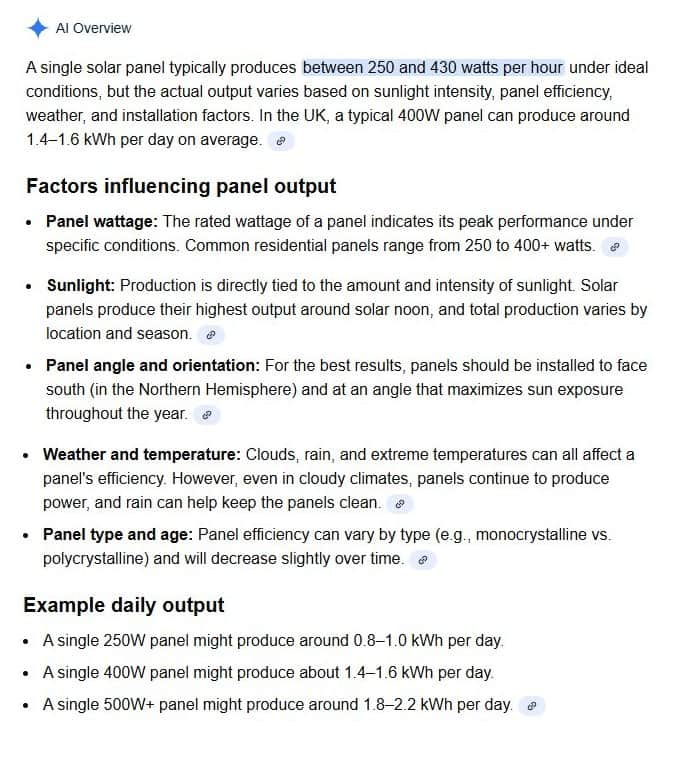Really? By what measure of efficiency? If it is fuel in for electricity out then both solar and wind (zero fuel) would be infinitely high efficiency. Which is quite efficient.
They might do that in Australia Bruce, but not here… ![]()
Because you have power 24/7 whether the wind blows or the sun shines.
Perhaps I should have said ‘Reliable’
I don’t really care about efficient, as long as I can turn my heating, lights and hob on when I want to.
The trouble with yer green energy, is that it only produces when nobody wants it…
By the way…It might seem free at the point of generation, but you’ve got to try and store the stuff, something that is quite elusive at the moment. I hope that you factor in the cost of your ‘free’ electricity to thousands of wind turbines and hectares of solar panels plus hundreds of miles of cable and huge lithium battery storage facilities that only last 20 years if you’re lucky.
Whereas a combined cycle gas fired power station turning out the same output can hardly been seen behind some trees on a small patch of land…
Which would you say is ‘Greenest’?
No, sorry Bruce, they stop if it’s windy, and they stop if it’s not…
![]()
I think the word is “ought”
If a turbine can turn, then it ought to. There is no point to paying a turbine operator a fee to not create energy/electricity. But, that’s what happens.
Got it.
Part of the issues is that we haven’t got sufficient infrastructure to handle excess energy. I don’t really understand the physics/mechanics of it all, and so no doubt some of you will be able to correct my errors.
But, as far as I am aware, if there is, say, a shortage of available renewable energy in Cornwall, it is not possible to utilise a potential surplus available in Scotland. Hence, fossil generators need to be turned on more than they might otherwise need. Even more bonkers is that the turbines in Scotland would be turned off but the companies still get payment via subsidies.
Sounds about right to me Dex
![]()
Wind turbines are one thing, but solar panels in the UK…That’s just sackless… ![]()
This is the contribution that solar panels made to the grid yesterday…(solar is the yellow stripe)
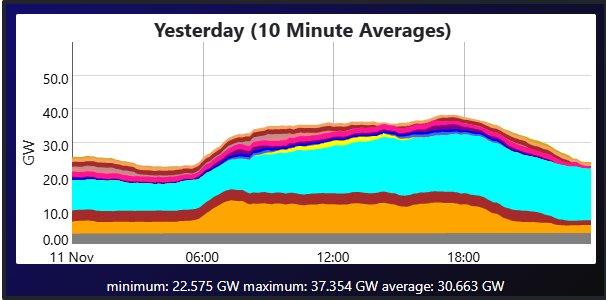
It will be like this until the end of March when the days get longer than the nights.
I have lots of solar powered lights scattered around the garden, and since September they only last about 2 or three hours after charging stops. At present, you are lucky to get one hour of illumination from them. During the summer (when nobody needs much electricity) they last completely through the night.
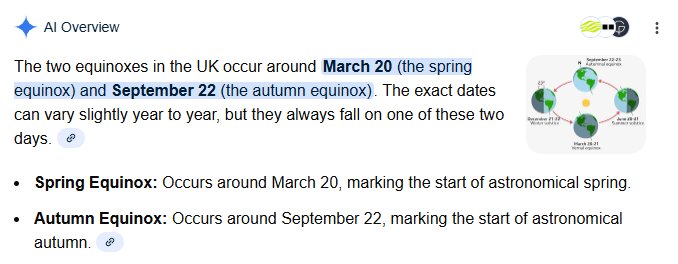
Apart from small applications on private dwellings, are they really worth the expense, pollution in manufacture, pollution in decommissioning, and the vast amount of land that solar farms require?
Wind Turbines however…Have got promise…
How many of these would you have to lump together to make a substantial addition to the national grid? Bearing in mind that it would only be during the day.
I tried to find the solar hours calculator but was unsuccesful but I did come across this
It seems that the peak averages about 3 or 4 hours per day. That is basically three or four hours of “free” electricity. Sure you have to pay for the infrastructure but it pays for itself in a relatively short time.
That should mean that worst case you reduce your electricity bill by about 14% surely that is not to be sneezed at?
Thanks Bruce, but I don’t think the infrastructure would pay back the cost of setting it all up anytime soon, and that prime farmland could be feeding lots of people and providing jobs.
I have yet to see a solar panel farm in the UK use the land for anything other than solar panels, and when you live on a small island with almost 70 million people, land is so precious.
and solar panels produce electricity when you least need it, so you need to factor in the cost of huge lithium battery storage facilities, and the land that they require…Which would probably be about the size of land needed for one gas fired power station that would provide a reliable 1 or two gW’s of power round the clock.
I was thinking more in terms of roof top solar not solar farms.
I do think that domestic use of solar panels is a good idea Bruce, I just don’t think it’s any use for mass use with hectares of land and the need for battery storage.
A letter to the BBC from Roger J. Arthur, CEng, MIEE, MIET. After a documentary featuring Chris Packham.
Dear Laura Kuenssberg
, On your show, Chris Packham repeated the false claim that the sooner we get most of our electricity from renewables the better because it will be cheaper. That is wrong, not least because solar and wind intensity can be negligible for two or three weeks a year, when conventional power generation plant must be available to keep the lights on. Conventional power plant does not need such back-up. Try adding the capital, operation, maintenance and replacement cost of that back-up power plant to that of solar and wind to get the correct total. At around £5billion per GW, that would incur a further £200billion of capital. But sadly there was no one on your programme to challenge Mr Packham’s narrative, so here are some facts that you should feed back to him and to your viewers. In September 2024 the Minister for Energy Security and Net Zero said that bill payers ‘are to spend between £100 and £150 per household on new wind turbines’. But at £2.7 and £1.2billion/GW respectively, the capital cost of wind capacity, would be well over £200billion. That equates to more than £7,000 per household, ie around £700 per household pa over ten years, plus the cost of subsidies, but that was not challenged by the BBC. So far this century, over £200billion in green levies has been paid out (more than £6,000 per household) to promote solar and wind energy. Any further efficacy improvements will be marginal and throwing further subsidies at the technology is not likely to reduce costs much further. It will just drive even more UK industry to the likes of China, thereby accelerating global emissions. You clearly failed to notice that wind turbine Capacity Factors (CFs) have recently been reduced from 61 per cent to 43.6 per cent for Offshore and from 48.7 per cent to 33.4 per cent for Onshore wind farms. As a result the energy delivered by the 86 and 36 GW of UK wind farms planned for 2035 will be about 30 per cent less than expected, down from 611 to 433TWh (the CF is a measure of the Average Power Produced in GW divided by the rated power). Assuming an average cost of 25p per kWh, the value of the shortfall of around 180TWh is around £45billion pa, ie around £1,500 per household. That shortfall could be plugged by an extra 20 and 35 GW of Off/Onshore wind farm capacity at £2.7 and £1.5billion per GW, totalling about £110billion more in capital cost, ie well over £3,000 per household. Added to that is the cost of 3,000 miles of vulnerable offshore submarine cable connections, plus 600 miles of HV overhead lines, along with substation costs, which together will add more than £3billion to the capital cost of wind farms. That neglects the extra transmission power losses and the eye watering subsidies, which have been rising year on year, now comprising around 30 per cent of electricity costs. Of course wind farms are not maintenance free and assuming £50million/GW pa, the Operation and Maintenance (O&M) cost for 135GW of wind capacity the O&M cost equates to more than £6billion pa. The wind turbines have to be replaced at intervals of around 20 years (gearboxes more often) and their energy output will never be free. You will also need to grasp the causes of the Iberian power failure to see that our grid is not left unfit for purpose by ideological forces. In case you missed it, the capital plus the O&M cost of the backup power capacity, will need to be added to the cost of wind and solar. If your verifying department needs any help in scrutinising this information, then please let me know. Regards, Roger J. Arthur, CEng, MIEE, MIET.
The fact that one person stated that removing all fossil fuel based energy is a target and a good objective does not make it policy or make it something many others aim for. The author of the letter of complaint was correct - for now, there is a need for fossil fuel electricity generation alongside wind and solar for all the reasons stated.
Where he is wrong is to focus on the set up and maintenance costs of solar and wind. He does not detail the set up and maintenance costs of a gas turbine based power station. He is right that renewable electricity will not necessarily be tons cheaper than fossil fuel but he does forget to note that gas prices can fluctuate and the UK energy sector has no control over this. The current price is $4 per MMBtu but back 20 years ago it reached $15.
The issue is the balance. Fossil fuel pollutes and costs money to run. This source of electricity needs to be in the minority, not the majority.
In the UK large swathes of land covered in solar panels are a waste of money and farm land, and it doesn’t take a financial wizard to realise that the cost of returns from a solar farm in the UK, compared to a Gas Fired Power Station is astronomical. Strange how the cost of electricity spiraled out of control since we scrapped conventional power stations and started from scratch replacing them with thousands of wind turbines and now solar farms, together with hundreds of miles of cable and huge lithium battery storage facilities that only supply power for a very limited time. We are coming close to the time when some of the turbines are due for replacement. Solar panels can be taken out of service after one decent hailstorm.
It’s not just one scientist though is it Lincs…

But obviously these solar farms are worthwhile and financially viable - or there would not be many.
The returns are pretty good. On average: A 1-acre solar farm can generate between 350,000 to 450,000 kWh per year. If fully exported, this could earn approximately £40,000–£50,000 annually, It costs about £300k to build an acre of solar farm. So that’s a 6-7 year pay back. That is tremendously good. All the info I could find on gas turbine payback is between 9-15 years. And that assumes stable gas prices.
Currently the total area of land used for solar is about 0.07% of total land area. That is 7 hundredth of one percent. I’m not sure how amounts to large swathes. For example, golf courses take up 2% of UK land.
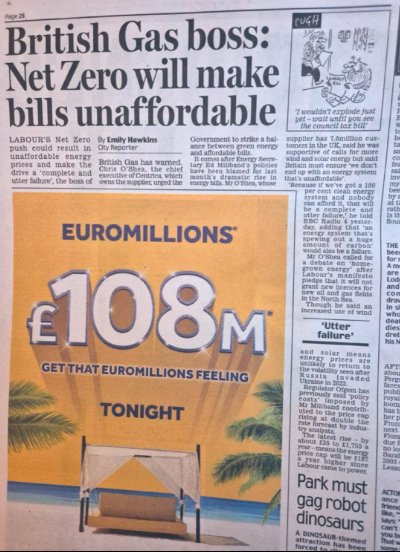
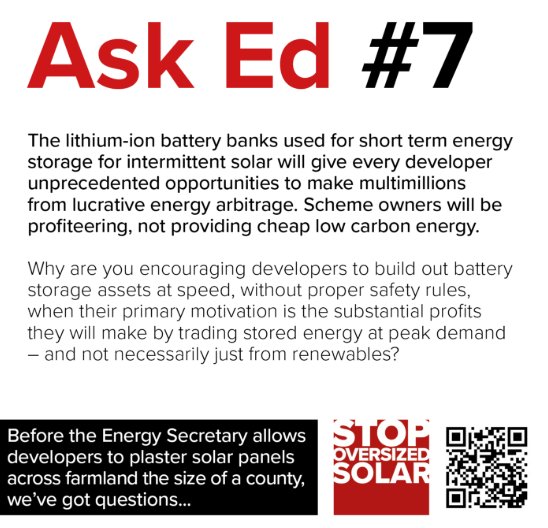
So that’s enough to supply 3500 homes providing you have 8 hours of daylight, plus, the huge lithium battery storage facility that will need to be built to supply the power at night…And some private company telling you when and who can have the stored electricity.
In order to power the country with wind turbines and solar panels you will have no space left to put the people, these green projects take up so much land. Whereas a small gas fired power station will be nestled away behind some trees and provide enough power for a couple of cities…Even when it’s dark, with no need for the dangerous, polluting lithium battery facilities…
It’s not always about profit and money Lincs…(even though I think it would be a lot cheaper) people have to live here, you are turning the UK into an Industrial Estate.
I was not attempting to claim solar are farms are the complete answer to any country’s electricity needs. You have (at length and repeatedly) highlighted the shortcoming of solar and wind and in particular the need to provide energy storage. I’m not arguing with that nor the reasonable criticisms you’ve made. But I am certainly happy to challenge your more inaccurate claims.
I was simply pointing out that (1) solar farms do make money and their return on investment is in fact more attractive than gas turbine power stations, (2) they are not really covering that much of the country at all. That is, debunking two of your more inaccurate claims (whilst wondering why you have not worried about the good agricultural land being taken up by golf courses).
You have never mentioned ‘Golf Course’ before Lincs… ![]()
However, I would prefer to have the UK covered in well manicured Golf Courses than fields full of solar panels and thousands of whirring wind turbines…Don’t you like golf?

